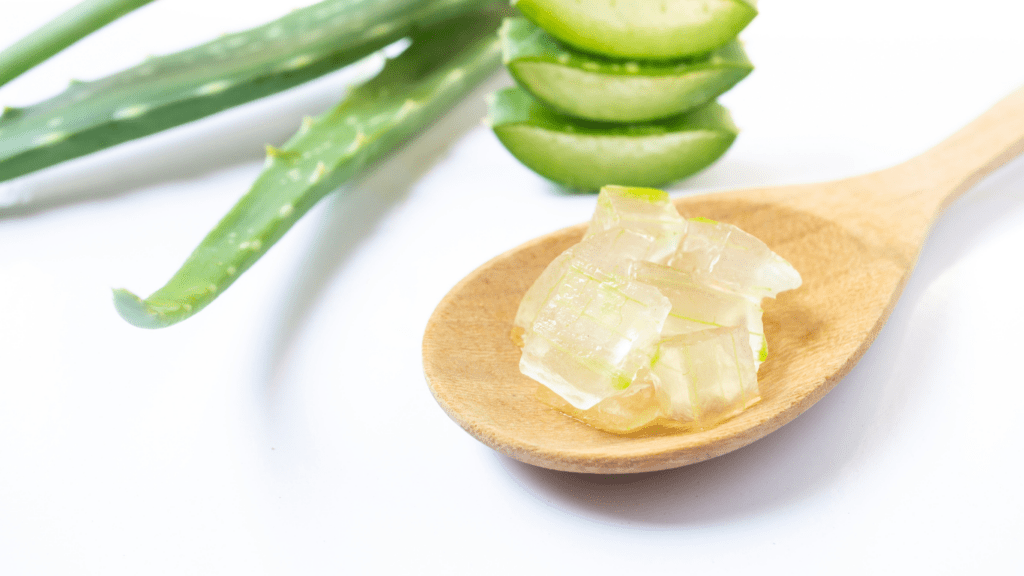The Benefits of Natural Ingredients for Skin Health
Choosing natural ingredients for skincare provides various advantages due to their nutrient-rich profiles and their ability to enhance the skin barrier.
Nutrient-Rich Profiles
Natural ingredients often contain essential vitamins, minerals, and antioxidants that nourish and rejuvenate the skin. For example:
- Aloe Vera: Rich in vitamins A, C, and E, aloe vera helps hydrate the skin, promotes healing, and reduces inflammation.
- Green Tea: Packed with antioxidants like catechins, green tea fights free radicals, reducing signs of aging and promoting an even skin tone.
- Honey: Contains natural enzymes and amino acids that moisturize and soothe the skin, enhancing its texture and radiance.
- Coconut Oil: With fatty acids like lauric acid, coconut oil provides deep hydration and has antimicrobial properties that benefit acne-prone skin.
- Shea Butter: Rich in fatty acids and vitamins, shea butter deeply moisturizes and reinforces the skin barrier, making it more resilient.
- Jojoba Oil: Mimics the skin’s natural sebum, jojoba oil balances oil production and helps maintain the skin’s moisture levels, strengthening its barrier.
- Oats: Have avenanthramides, which possess anti-inflammatory properties that soothe irritated skin and support the skin barrier.
- Chamomile: Contains azulene, an anti-inflammatory agent that calms the skin and supports healing while fortifying the skin’s protective barrier.
Top Natural Ingredients for Radiant Skin
Using natural ingredients helps achieve radiant skin by leveraging their potent properties. I’ll detail top choices that offer significant skincare benefits.
Aloe Vera: Soothing and Hydrating
Aloe vera excels as a soothing and hydrating agent due to its rich water content and polysaccharides. It provides relief for sunburns and minor abrasions, making it ideal for sensitive skin.
Aloe vera contains vitamins A, C, and E, which support skin repair and enhance its elasticity.
Coconut Oil: Moisturizing and Anti-Inflammatory
Coconut oil delivers deep moisturization through its fatty acids like lauric acid. It keeps the skin soft and smooth by forming a protective barrier.
Its anti-inflammatory properties reduce redness and irritation, helpful for conditions like eczema. Coconut oil also includes antioxidants that combat skin aging.
Green Tea: Antioxidant Powerhouse
Green tea stands out as an antioxidant powerhouse due to its high concentration of polyphenols. These antioxidants neutralize free radicals, reducing oxidative stress and preventing premature aging.
Green tea helps alleviate acne and redness because of its anti-inflammatory effects. Regular use can contribute to a clearer, healthier complexion.
Incorporating Natural Ingredients Into Your Skincare Routine

Including natural ingredients in a daily skincare routine provides numerous benefits. Here’s a guide on how to seamlessly integrate these elements.
Direct Application Tips
Applying natural ingredients directly to the skin is straightforward and effective. Cleanse the skin thoroughly before using any ingredient to ensure proper absorption.
- Aloe Vera: Apply pure aloe vera gel directly to the skin for soothing and hydration.
- Coconut Oil: Use as a moisturizer for dry skin and patches.
- Green Tea: Brew green tea, let it cool, and use it as a toner to combat aging and reduce acne.
- Honey: Dab raw honey on acne spots for its antibacterial properties and healing benefits.
- Jojoba Oil: Apply a few drops to the face as a natural moisturizer that mimics skin’s natural oils.
- Shea Butter: Use as a body lotion, especially on dry elbows and knees.
- Chamomile: Use chamomile tea bags as a compress for inflamed or irritated skin.
DIY Skincare Recipes
Creating DIY skincare products at home lets you customize treatments and ensure ingredients are natural and effective such as:
- Aloe Vera and Honey Mask:
Mix 2 tablespoons of aloe vera gel with 1 tablespoon of raw honey.
Apply to the face, leave for 15-20 minutes, then rinse. - Green Tea Toner:
Steep 1 green tea bag in a cup of boiling water and let it cool.
Use a cotton pad to apply the tea to your face. - Oatmeal Scrub:
Combine 2 tablespoons of ground oats, 1 tablespoon of honey, and a few drops of water.
Gently exfoliate the skin, then rinse thoroughly. - Coconut Oil Lip Balm:
Melt 2 tablespoons of coconut oil and mix with 1 tablespoon of beeswax.
Pour into a small container and let it solidify. - Shea Butter Body Butter:
Blend 1 cup of shea butter with 1/2 cup of coconut oil and a few drops of essential oil.
Whip until light and fluffy, then apply to the body. - Chamomile Eye Compress:
Steep chamomile tea bags, let them cool, and place on eyes to reduce puffiness and soothe irritation.
Leveraging these approaches ensures that natural ingredients maintain their potency and efficacy, providing beneficial results.
Environmental and Ethical Advantages of Natural Skincare
Choosing natural skincare supports environmental sustainability and ethical practices. Below are detailed insights on sustainability and cruelty-free benefits inherent in natural skincare.
Sustainability Factors
Natural ingredients often come from sustainable sources, which reduce environmental footprint.
For instance, farming practices used for growing aloe vera, coconut, and green tea are typically eco-friendly, requiring fewer pesticides and synthetic fertilizers.
Additionally, natural skincare products usually feature biodegradable packaging, contributing less waste to landfills. By choosing these products, consumers help conserve biodiversity and reduce pollution.
Cruelty-Free Practices
Natural skincare brands usually adhere to cruelty-free standards, ensuring no animal testing occurs during product development.
Common certification organizations like Leaping Bunny and PETA (People for the Ethical Treatment of Animals) verify these claims.
When I choose cruelty-free products, I support the humane treatment of animals and foster ethical business practices.
Brands like Lush, The Body Shop, and Burt’s Bees exemplify commitment to cruelty-free skincare, delivering effective results without compromising ethical standards.


 Nicoleeny Castrolos, the founder of Body Care And Matter, is a passionate advocate for health and wellness. With a deep commitment to improving the lives of individuals, Nicoleeny has built a platform dedicated to delivering the latest insights on men’s and women’s health, nutrition, and mental wellness.
Nicoleeny Castrolos, the founder of Body Care And Matter, is a passionate advocate for health and wellness. With a deep commitment to improving the lives of individuals, Nicoleeny has built a platform dedicated to delivering the latest insights on men’s and women’s health, nutrition, and mental wellness.

